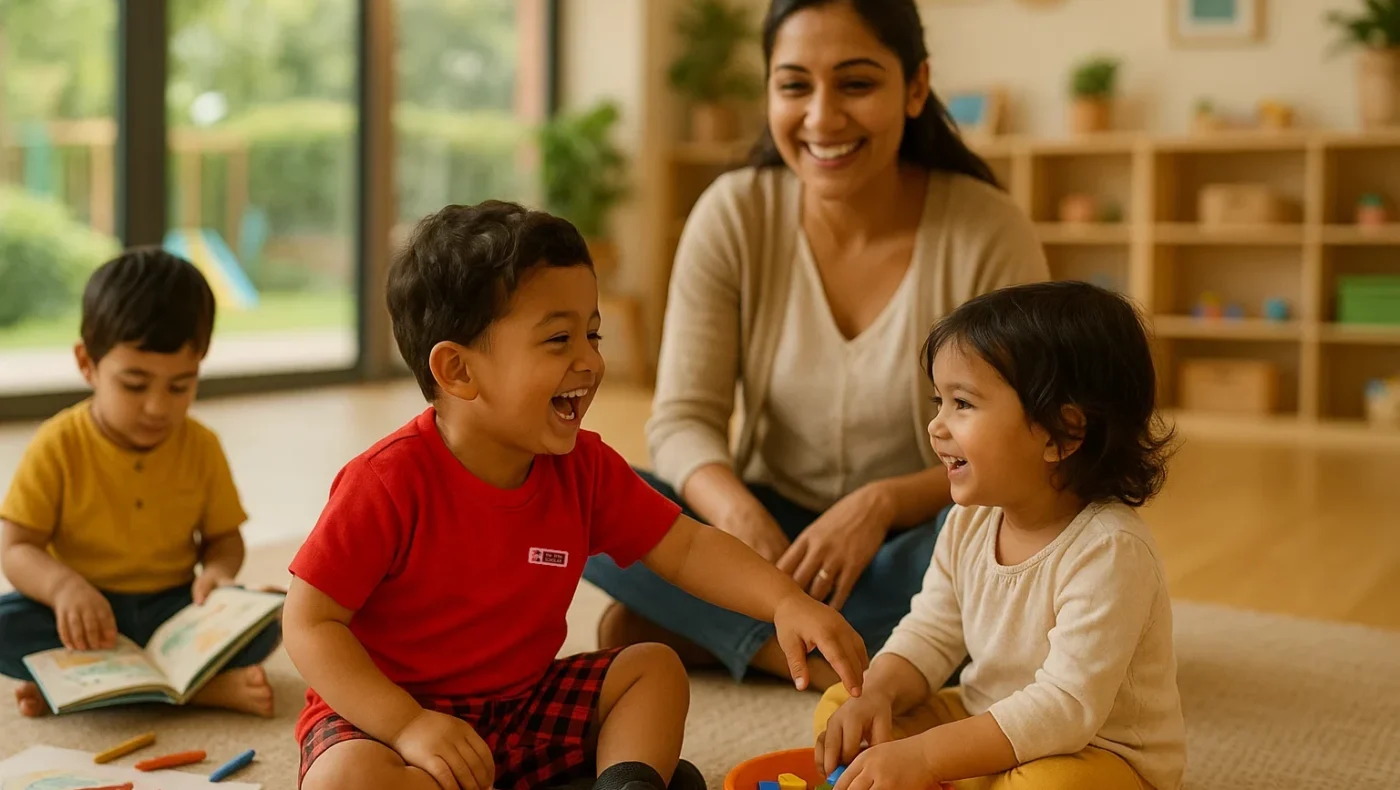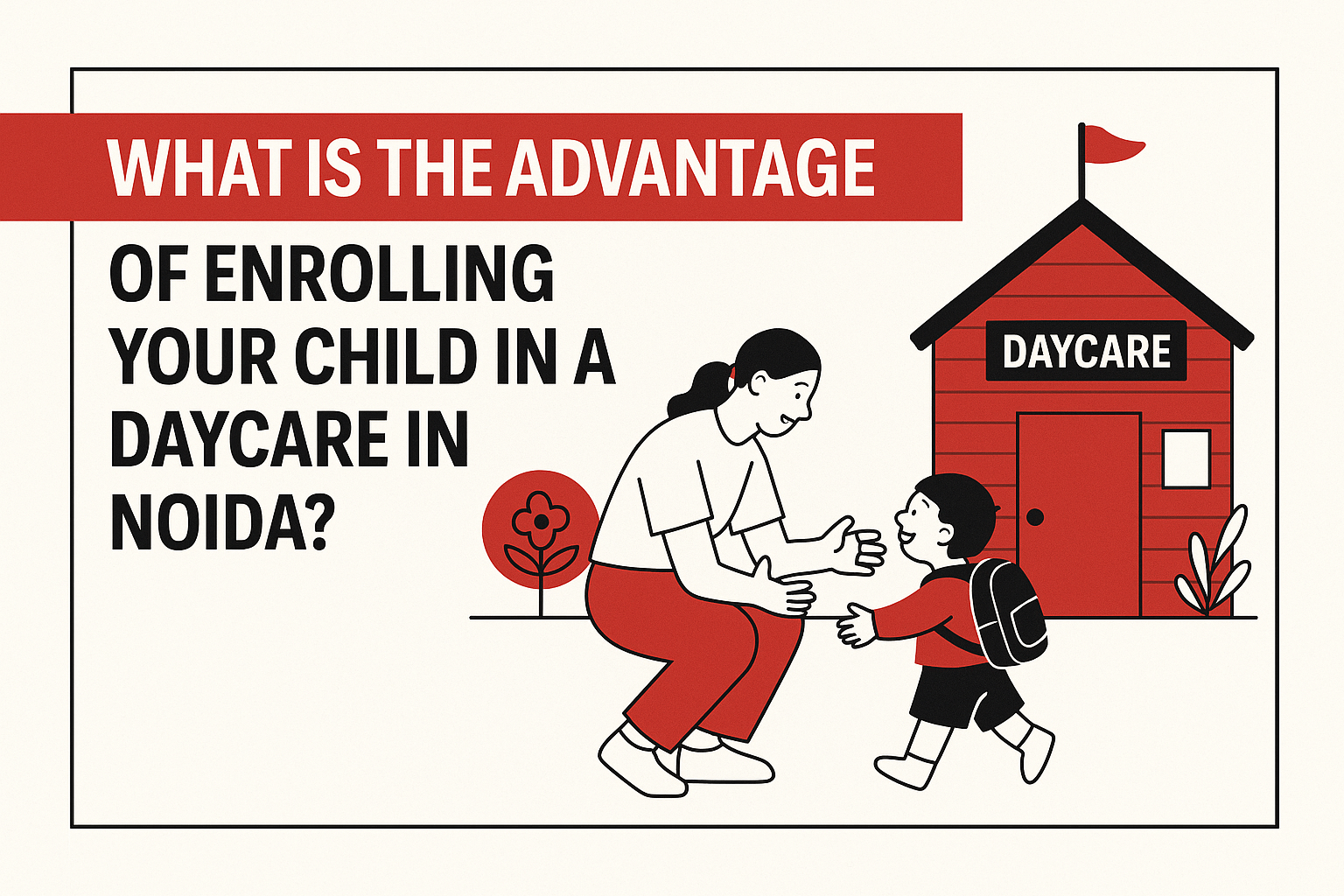The Culture of Daycare in Noida: What Today’s Parents Expect and Why It Matters
Walk into any modern daycare in Noida, and you’ll notice something beyond the usual sight of colorful walls and playful laughter. There’s an entire culture at work — one shaped by the changing expectations of today’s urban parents. For families navigating busy careers, evolving lifestyles, and the desire for holistic childhood development, daycare is no longer just a service; it’s a carefully chosen partnership.
As Noida continues to grow as a hub of working professionals, its childcare culture has evolved in equally dynamic ways. Parents now look for centers that reflect their personal values, work rhythms, and parenting philosophies. They expect a balance between emotional warmth, structured learning, and modern convenience — a combination that defines what makes a daycare environment truly meaningful in a metropolitan city.
1. From Supervision to Nurturing: How Daycare Culture Has Evolved
A decade ago, many families saw daycare as simply a safe place to leave their child while they worked. But in Noida — and across urban India — the concept has matured. Today, parents expect daycares to play an active role in shaping their child’s early social, emotional, and creative growth.
The most respected centers now blend play-based learning with gentle structure. Activities are designed not just to keep children occupied but to help them communicate better, think independently, and build empathy. This transformation mirrors the lifestyle of dual-income families, who want environments that encourage independence while still feeling as personal as home.
In neighborhoods like Sector 19, the cultural shift is especially evident. Families often choose institutions that prioritize individual attention, community involvement, and a blend of education with emotional care — qualities that are redefining what parents seek from a daycare in Noida.
2. What Parents Expect from Daycare in Noida
Urban parents have become more aware, observant, and selective. They now expect a level of professionalism and engagement that goes well beyond traditional childcare. Surveys show that more than 70% of Delhi-NCR parents look for regular updates about their child’s day — from meal details to activity photos and progress notes.
Communication has become a key trust factor. Parents prefer daycares that share digital updates through apps or portals, giving them a sense of participation in their child’s routine. Emotional connectivity is another must-have — parents want caregivers who can form real bonds with their children and offer a comforting sense of stability.
Cleanliness, safety, and curriculum quality continue to be priorities, but now, they’re seen as minimum standards. Parents in Noida often compare programs based on the value they deliver — focusing on how creatively the daycare integrates play, learning, and emotional care into everyday life.
3. Technology as a Bridge of Trust
Noida’s tech-savvy population has also changed the way parents evaluate childcare. Technology is no longer just a convenience; it’s a reassurance mechanism. Leading daycares now use CCTV access, attendance logs, and parent communication apps to build trust and transparency.
Parents, especially those working in IT and corporate hubs around Sectors 18, 19, and 62, expect such digital tools as a given. They help bridge the emotional distance during long workdays, offering small but powerful reassurances that their child is happy and safe.
However, technology in daycares today goes beyond monitoring. Some centers also integrate interactive learning modules — digital storytelling, smart screens for guided play, and progress tracking systems. When used thoughtfully, these tools strengthen the connection between caregivers, children, and parents, creating an ecosystem of openness and confidence.
4. Beyond Routine: The Rise of Enrichment and Extracurriculars
For many parents, choosing a daycare in Noida now feels similar to selecting a preschool. The expectation is that children should not just be cared for — they should be exposed to experiences that nurture creativity and curiosity.
Daycares in Noida are increasingly offering activities like dance, art, storytelling, music, yoga, and early STEM concepts as part of their weekly plans. Parents see these not as optional luxuries but as essential parts of early development. The focus has shifted from “keeping children busy” to “helping them grow.”
This evolution reflects a broader understanding among urban parents that early exposure to diverse experiences builds emotional intelligence, motor skills, and confidence. It also mirrors their own professional worlds, where creativity and adaptability are as valued as academic achievement.
5. Cultural Sensitivity: Reflecting Noida’s Diversity
Noida’s growing population represents families from across India — and increasingly, from around the world. This diversity has naturally influenced how daycares operate. The best centers now celebrate festivals from multiple regions, encourage bilingual communication, and teach inclusivity through stories and group activities.
These cultural experiences do more than decorate calendars; they help children learn empathy and appreciation for differences from a young age. Studies show that multicultural exposure at early stages enhances adaptability and vocabulary while shaping a more open-minded worldview.
Daycares across Noida now see cultural sensitivity as part of education itself. Teachers and caregivers are trained to respect linguistic and lifestyle differences, ensuring that every child — and every family — feels represented and comfortable. This evolving inclusiveness forms one of the strongest pillars of the modern daycare in Noida ecosystem.
6. The Community Connection: Sector 19 and the Local Pulse
While Noida’s growth has brought a modern edge to parenting, its sense of neighborhood remains strong. Communities like Sector 19 have preserved the idea of local belonging — where parents, caregivers, and teachers often know each other personally.
Many daycares in such areas serve as community anchors. They host parent-child events, share feedback openly, and involve families in celebrations and child progress reviews. This interconnectedness builds long-term trust and helps children see learning as a social experience rather than a solitary one.
Parents appreciate when daycare staff are not just professionals but part of their extended community. It reinforces the comfort that their child is growing up surrounded by familiar faces and shared values — something that’s especially meaningful for working parents managing tight schedules.
7. Why These Cultural Shifts Matter
The evolution of daycare culture in Noida tells a larger story about parenting in modern India. It reflects how families today want to raise emotionally intelligent, adaptable, and socially aware children. The focus is no longer just on milestones but on experiences that shape personality and resilience.
This shift also highlights how cities like Noida are setting new benchmarks for childcare standards. The mix of technology, empathy, cultural inclusion, and flexible structures is becoming the model other metros aim to follow. With each new center and curriculum innovation, daycare’s in NCR especially Noida are defining what progressive early learning looks like in an urban context.
It’s also a reminder that good daycare isn’t just about children — it’s about the ecosystem of trust between parents, teachers, and communities. When these elements align, the daycare experience becomes a cornerstone of confident parenting in metropolitan life.
8. The Future of Daycare Culture in India’s Metros
Looking ahead, daycares in Noida are likely to become even more personalized. Parents will continue to expect flexible hours, real-time updates, and tailored learning paths. Technology will remain a facilitator, but emotional connection and cultural awareness will be the true differentiators.
The Indian childcare market — already valued at $4.6 billion in 2024 — is expected to grow rapidly, with Noida among the key growth centers. This surge isn’t just about numbers; it’s about evolving philosophies. As more parents prioritize social-emotional development and inclusivity, daycares will need to stay aligned with these modern expectations.
In that sense, Noida is not just a location but a lens — a way to understand how cities are reimagining early education to keep pace with their own fast-changing identities.
Conclusion
The culture of daycare in Noida mirrors the evolution of urban parenting itself — thoughtful, connected, and forward-looking. Parents no longer settle for safe spaces alone; they look for environments that nurture confidence, empathy, and creativity in equal measure.
For families in metropolitan settings, daycare has become an extension of home — one that supports both personal and professional aspirations with care, transparency, and understanding. As this cultural shift continues, Noida’s daycares will remain at the heart of what it means to raise children in a world that’s modern yet deeply human.
🌿 Call to Action
If you’re exploring early learning options that blend care, creativity, and community — click here to enroll your child at TLS Daycare (Sector 19, Noida) and experience how thoughtful childcare can truly feel like an extension of home.


